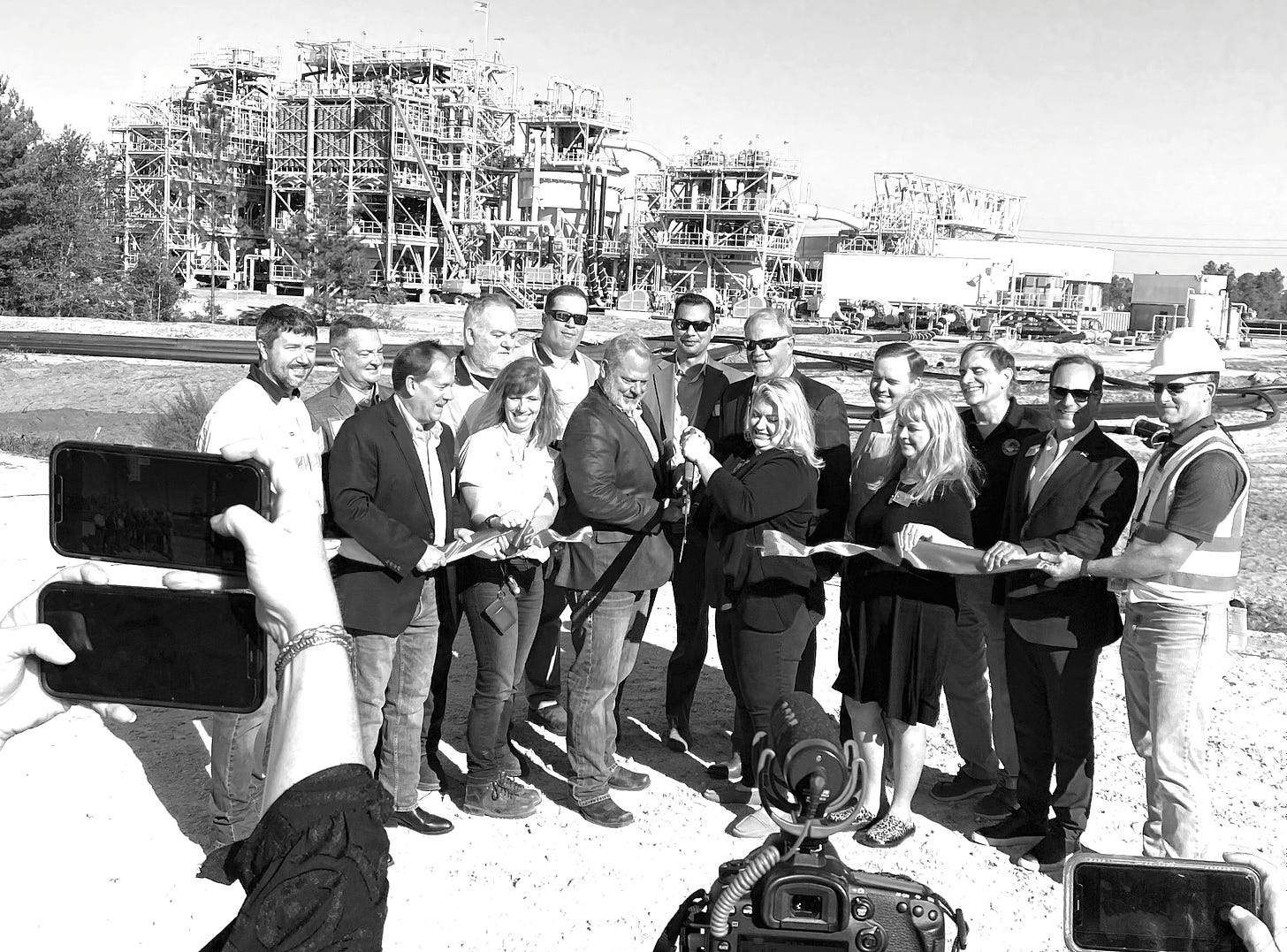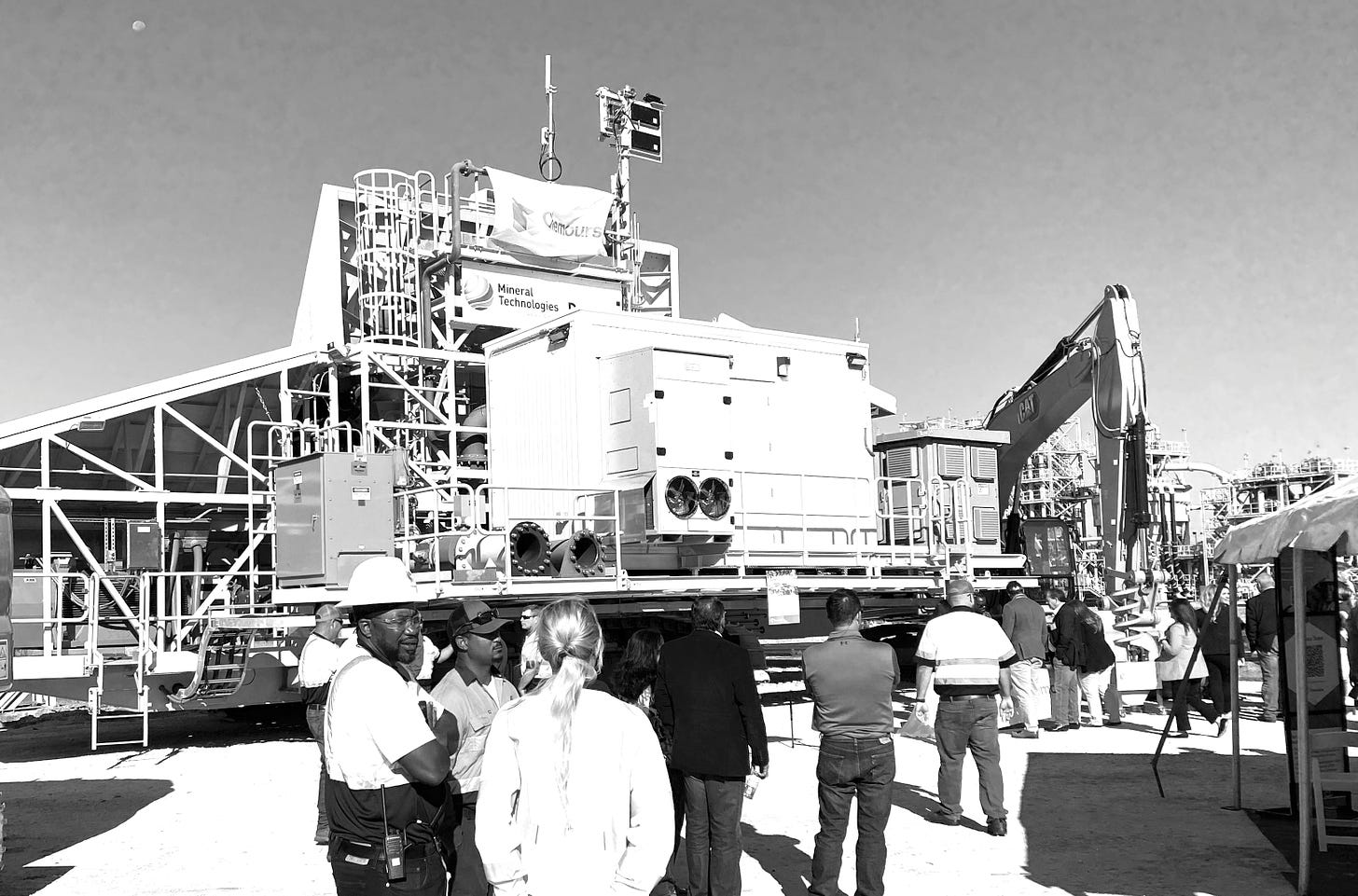Chemours dedicates new plant
Chemours held a ribbon-cutting ceremony at its new $93 million Trail Ridge plant on Friday, Oct. 14, in conjunction with the Clay Chamber of Commerce.
The company first operated at Trail Ridge as the E.I. DuPont Company, beginning in 1946. In July 2015, DuPont spun off the newly created Chemours, which assets included those of its ilmenite and zirconium mining operations.
Chemours Environmental Manager Connie Henderson said that previously, miners used a wet mill floating on a dredge to mine sand and minerals. The dredge required a 12 to 15-acre pond to operate.
Now, Chemours is using two mobile mining units instead of the dredge.
About the size of four to six dump trucks, the mobile mining units can access areas previously missed by dredge mining.

Using centrifugal force to separate the metal minerals from the sand, wet mill operations will now be done at the company’s Trail Ridge Plant.
The wet mill technology was developed initially by the Humphries Gold Company in the 1940s and was the breakthrough that brought mining to Trail Ridge.
Henderson said that after separating sand from minerals at Trail Ridge, the tailings are returned to the mining site for reclamation. The minerals are taken to the company’s Lawtey plant for further processing.
At Lawtey, a dry mill operation uses magnets to separate the ilmenite, staurolite and zirconium.
The three minerals are then sent to different plants for further processing.
Everything we touch
Ilmenite is the raw material for titanium dioxide, a white pigment used in a vast array of products.
Zirconium is also a whitening agent but is mainly restricted to ceramics.
Staurolite is a sand in which grains are shaped like a cross. The mineral is used for sandblasting.
Jody Science, a Chemours minerals operations co-director, said titanium and zirconium are essential to U.S. national security and economic prosperity.
“These critical minerals are produced in limited quantities,” she said, “but Clay and Bradford and the surrounding region is a critical domestic source of these minerals.”
Science added that Americans consume around six pounds of titanium dioxide a year.
“So, it goes into just about everything we touch,” she said.
Science said that 97% of the material the company mines is returned to the ground.
“The topsoil is replaced,” she said. “We put in erosion control measures, recreate wetlands, and then plant natural grasses and seedlings back to how it was before we mined.”
She also said that 98% of the water used in the mining process is recycled.
“This shows that we can provide sustainable solutions while meeting our commitment to process these minerals,” she said.
Another 100 years
Mark Smith, the company’s vice president of global operations, said the $93 million plant was five years in the making.
He also said the new plant has hired third-generation mining employees, reflecting Chemours’ 70-year heritage of mining at Trail Ridge.

“I have a personal goal that we’re going to be doing this for at least another one hundred years,” he said. “We can do it, and we can do it the right way.”
Vital to national security
Congresswoman Kat Cammack congratulated the company on its new operation, noting that the plant’s economic impact reaches both Clay and Bradford Counties.
She also said the project is vital to national security.
“The world needs a strong America,” she said, and this project is just one small step in the grand vision that we have to make America dependent on ourselves rather than on others around the world for our critical minerals.”
Cammack noted that the U.S. is the world’s Number 1 importer of minerals and that China is the world’s leading exporter.
“This company has a footprint not just here in our community but around the world,” she said. “They’re helping represent and push forward what it means to be diversified and have this America-first mindset.”
Cammack said that mining is a controversial, almost taboo topic in Washington.
“There’s a lot of bad information,” she said, many misconceptions.”
The congresswoman praised public officials who take calls from misinformed citizens.
“Quite frankly, they don’t know what they don’t know,” she said of mining critics, “and in some cases, they don’t want to know. They have opinions without knowing the facts.”
Cammack also said projects like the new Trail Ridge plant are essential to rural America.
“What we’ve seen around our country is people who say: You know what? I’m going to grow up, and I’m going to go to some big city, and I’m going to get a job where I can sit in an office all day,” Cammack said. “That has been the prevailing narrative and culture that has been pushed.”
In her view, Cammack said rural America is at a turning point, and the Trail Ridge plant, with its 50 new jobs, is helping to foster that turnaround.
“The next generation of folks (is going to) say: You know what? I’m going to stay here. I’m going to build my life here. I’m going to raise my family here.”
Four generations of workers
Clay Chamber President Jon Cantrell emphasized the local economic impact of the plant.
“Three generations of Clay County and Bradford County families have made a living out here,” he said, “and we’re talking about the fourth generation with this investment.”
Clay County Commissioner Betsy Condon highlighted Chemours’ contributions to area elementary schools, promoting science, engineering, technology, and math to primary school students.
“Chemours has given $12,000 to Wilkinson Junior High School in Clay Hill and Keystone Heights Elementary for STEM projects right here in our district to help educate our kids that are the children of employees who work here,” she said.
Condon said Chemours employees have volunteered at Keystone Beach cleanup events, and the company funded a swimming platform at the beach.
Science wrapped up the ribbon-cutting ceremony by adding to Condon’s talk about educating the next generation of scientists.
“One of my favorite stories is that recently at one of the local schools, a young man proclaimed at the end of our talk: “I was gonna be a football player, but now I’m gonna be a geologist.”
